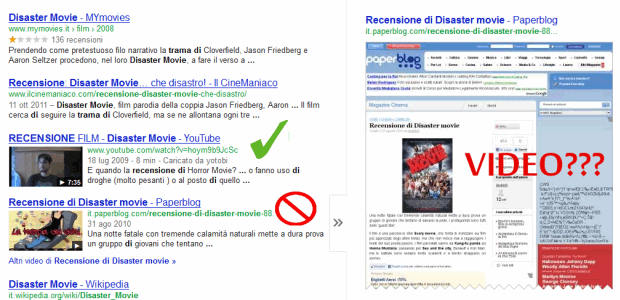
Are Rich Snippets the New Generation of Spam?
This YouMoz entry was submitted by one of our community members. The author’s views are entirely their own (excluding an unlikely case of hypnosis) and may not reflect the views of Moz.
Every SEO specialist knows that a good ranking is not enough to get clicks from the SERPs, mostly if you work in niches filled with videos, images, Google Shopping items or local listings. So every optimization that can grow your CTR of even one digit in percentage can be fundamental.
We all remember, for example, those little tricks to attract the user attention with special characters in the title tag that worked some years ago. During time search engines have stopped showing them, but there's been a time when you could search for Church of England and find this (taken from Aukseo.co.uk)

There's also been someone who made an art of meta description: Darren Slatten, for example, had an awesome one some time ago (before Google changed its way of showing sitelinks):

These were the past days, you could say, and who cares of these little expedients, now that we have Rich Snippets?
But I'm asking you: are Rich Snippets really rich, or are they just a new generation of spam?
Honestly, I don't know. When the three biggest search engines announced Schema.org I thought: "Hell! This is a great opportunity!" and many other SEOs like me, I guess. A recent very informative post here on SEOMoz shows a variety (a richness, if you prefer) of successful implementations and most of the SEO community agrees adding the right markup can be important.
But, it's about adding the markup... or adding the content to be marked, maybe? In many SERPS, I see the second option. Do you want some example of fake rich snippets? I'll give you three...
1) Reviews
I do SEO for an horoscope website (Oroscopo.bz), and I've added a custom field to my Wordpress theme to add a rating to the 2012 yearly horoscopes, since it makes sense to "rate" new year for each zodiac sign. So it's somewhat acceptable that Google shows my hreview markup in SERPs, like this:

But what if I add some artificial content to a page, just pretending it's reviewing something (or users have reviewed something)? Well Google adds shining stars to the snippet even if this review is totally false.

Is it an isolated case? No, it isn't. There's a plenty of fake reviews out there. And there's more beside Reviews: let's go on...
2) Recipes
Let's say this Sunday I want to cook a Sicilian Cassata and I search on Google for the recipe. I get these results:

I look at them and I say: "Wow! I can make a Cassata in 20 minutes! This is great! Let's try...".
Is this really great? Damn, it's not! It's not possible to make a Cassata in that time and the rich snippet is giving me false information. But I don't know this until I start cooking and I realize it takes a lot of time to prepare the cake. I clicked the result with the shorter time because I was attracted by the quickness. And I was gamed.
So if you do SEO for a recipe website, you can try this: look at the SERP and offer some minutes less. But, how many less? If you are honest, five is fine. But if you aren't... Ok, you've got the point...
3) Videos
I've encountered fake video rich snippets in few occasions, but few doesn't mean never. And this kind of deceptive snippets gets a lot of attention, at least because they bigger than the others.
Have you ever met them? This is an example:

If you visit the page, there's no video in it (as the instant preview shows). A quick look at the code and you can spot a link rel=image_src in the head section, together with other Open Graph metas, but even without a link rel=video_src (that should be required) Google renders the code as it contained a video.
3+1) Authorship
I'm just speculating with this, but what about rel=author markup?
Let's say I want Wilbur Smith being the author of my book reviews and Wilbur Smith hasn't a Google Profile... I add the markup and here it is:

Well, it's not easy to have an author rich snippet in the SERP (to be honest, I see very few real ones too), but suppose you convince tons of people that your fake profile is Wilbur Smith's legit one and you make them add him to their circles... Could it work, at least for some time? Who knows. But I'm quite sure spammers will try something in this sense.
Conclusion
I know saying rich snippets can be the new generation of spam is a strong assertion and I'm a bit exaggerating, but I fear this great opportunity to add value to our websites is too easy to be used in a deceptive way.
So I'm asking you: couldn't a negative user experience make people being suspicious about rich snippets? Couldn't too much rich SERPs turn into poor ones?
I'm curious to know your thoughts about this...
Finally, if you liked this post and are interested in my opinions, Posizionamento Zen is my SEO blog (in italian); I also tweet (mostly in - bad - English) as zen2seo.




Comments
Please keep your comments TAGFEE by following the community etiquette
Comments are closed. Got a burning question? Head to our Q&A section to start a new conversation.